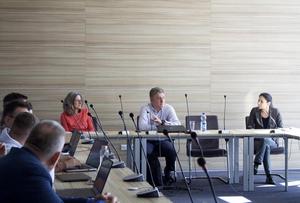In the framework of the Ludovika Scholars Program, Memet Memeti, former Dean of the South East European University in Tetovo, lawyer and public administration expert, visited the Faculty of Public Governance and International Studies. During the one-week programme, Professor Memeti gave a public lecture for students and a more informal discussion for colleagues interested in the topic, during which he presented in detail the ethnic specificities and challenges of local public administration in Northern Macedonia and Kosovo.
During the public lecture, the professor placed particular emphasis on the situation of ethnic minorities and their impact on local administration in Northern Macedonia and Kosovo. He also discussed decentralisation processes, the protection of minority rights and the freedom to use local languages. Professor Memeti also shared his thoughts on the "good governance" principles being piloted in his country, based on transparency, efficiency and citizen involvement to improve the quality and delivery of local services.
In the framework of the Ludovika Scholars Programme, he also took part in professional workshop, where, in addition to comparative analyses between Northern Macedonia and Kosovo, he also addressed current issues of minority relations and community rights. He focused on the interaction between local governments and ethnic groups, as well as on the need for integration policies and peaceful coexistence between different ethnic groups.
The professor underlined that the basic task of the municipalities in Northern Macedonia is to ensure equal public services for the different ethnic groups, based on the principles of redistribution and equality. The 81 municipalities, including Skopje, use significant resources, spending 5.6% of GDP on these purposes, he said. Local authorities have an important role to play in managing ethnic diversity, promoting integration and ensuring peaceful coexistence. Groups organised around the concept of "community", such as ethnic and linguistic communities, have special rights, including language use and political representation. However, quotas can also create problems and political games. Discrepancies between legal requirements and practical implementation are common, which is a major challenge for local authorities.
For example, the development of primary education is a priority in the annual development programmes, but in practice not everything happens as the legislator would like - there are major discrepancies between de iure and de facto application of the law. The involvement of civil society organisations in local government is becoming more widespread, which helps to integrate participatory processes into local governance. This promotes transparency and the active participation of citizens in the process, thereby increasing the efficiency of local services.
In his view, digital transformation is an important area, but infrastructure constraints often hinder implementation. The shortage of IT staff, who are being squeezed out by the private sector offering higher salaries, is a further problem for local authorities.
Memet Memeti sees the need for cooperation and transparent governance at both international and local level to address the needs of different ethnic groups and promote conditions for peaceful coexistence between communities.
Professor Memet Memeti's visit proved to be not only enriching from a professional point of view, but also an opportunity for students, teachers and researchers to gain first-hand information and knowledge from an expert with a close but new cultural and political background, thus contributing to the academic and cultural dialogue at the university.
Text: József Sáfrán



